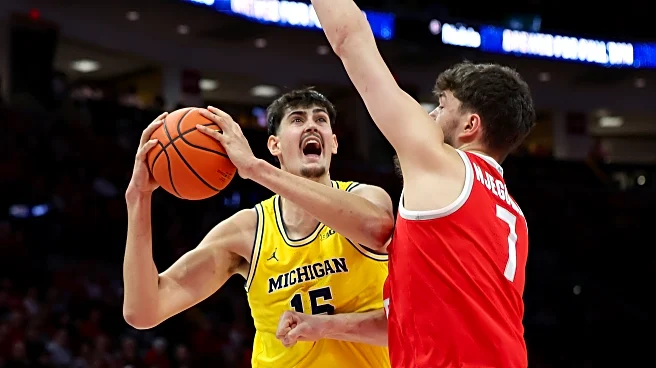What's Happening?
GameStop, known for its meme stock status, is experiencing a significant downturn in its share price despite reporting profitability. As of November 2025, GameStop's stock is trading around $20-$21 per share, marking a 30% decline year-to-date and over
40% below its 2025 highs. This drop comes despite a multiquarter profit streak and substantial cash reserves, including Bitcoin holdings. The company has shifted its strategic focus from traditional video game sales to trading cards and collectibles, as emphasized by CEO Ryan Cohen. Additionally, GameStop has adopted Bitcoin as a treasury reserve asset, which has linked its stock performance to Bitcoin's price fluctuations. The company has also issued warrants that could lead to potential dilution if exercised.
Why It's Important?
GameStop's current situation highlights the volatility and risks associated with meme stocks and companies heavily invested in cryptocurrencies. The shift towards trading cards and collectibles represents a strategic pivot aimed at higher margins, but it also underscores the challenges faced by traditional retail businesses in adapting to changing consumer preferences. The company's Bitcoin strategy introduces additional financial risk, as its stock price is now partially tied to the volatile cryptocurrency market. This development is significant for investors and market analysts who are monitoring the impact of such strategies on stock performance and company valuation.
What's Next?
GameStop's future will likely be influenced by several factors, including its upcoming Q3 2025 earnings report, the performance of Bitcoin, and the success of its trading card and collectibles strategy. The warrants issued by the company could lead to dilution if the stock price exceeds $32, affecting shareholder value. Additionally, the company's ability to execute its strategic pivot and manage its capital structure will be crucial in determining its long-term viability. Investors will be closely watching these developments to assess the potential risks and rewards associated with GameStop's evolving business model.
Beyond the Headlines
GameStop's transformation from a traditional video game retailer to a company focused on trading cards and Bitcoin holdings reflects broader trends in the retail and financial sectors. This shift raises questions about the sustainability of meme stock phenomena and the role of cryptocurrencies in corporate finance. The company's strategy may influence other retailers considering similar pivots, highlighting the importance of innovation and adaptability in a rapidly changing market environment.

















